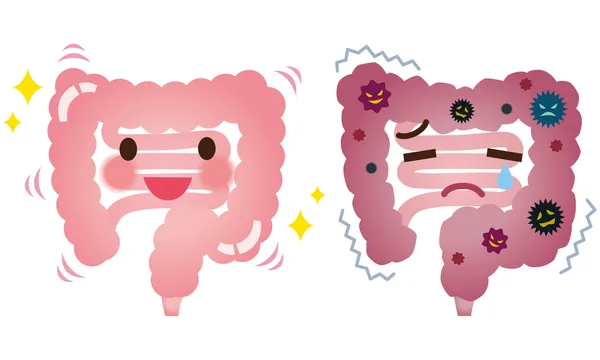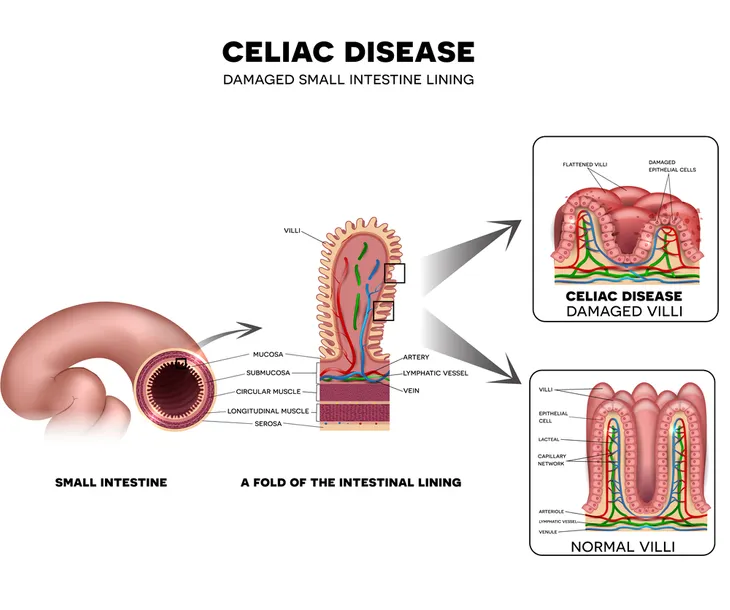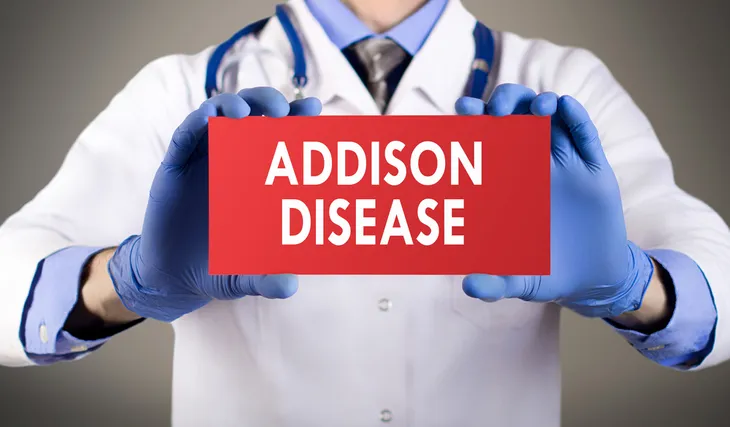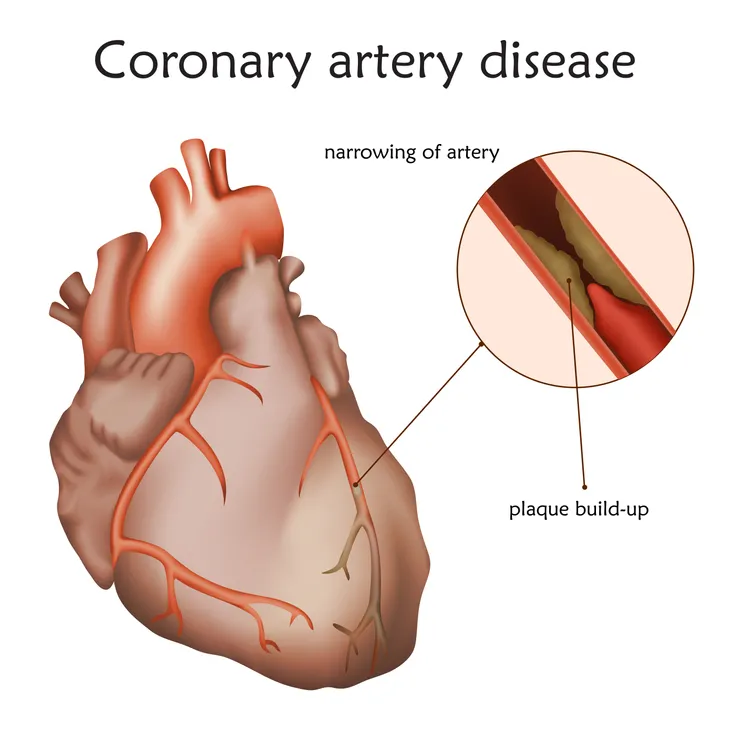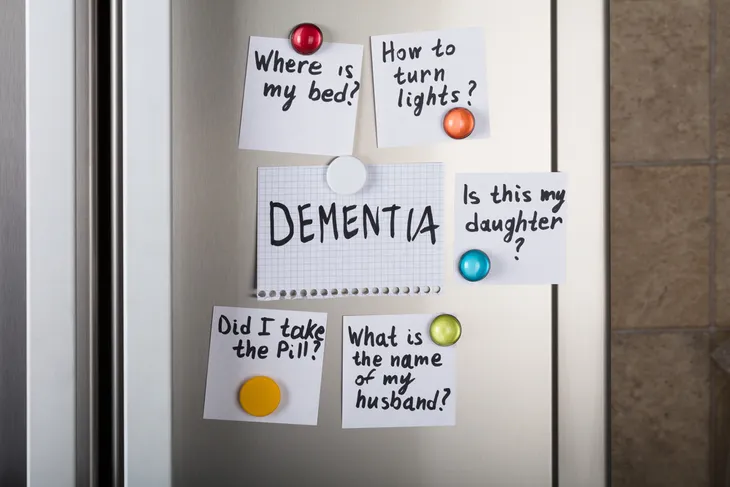We tend to focus so much on obesity and being overweight that being chronically thin or experiencing sudden weight loss is overlooked. Carrying around extra pounds is most often tied to health complications, but being underweight, or suddenly dropping pounds without an obvious explanation, can be a sign of a bigger problem.
While some people are just naturally slender (and that’s perfectly okay), others may have contributing factors that may require a visit to the doctor’s office. Here are some health conditions that can cause unexpected weight loss…
1. Overactive Thyroid
An overactive thyroid, or hyperthyroidism as it’s known in the medical community, occurs when your thyroid produces too much of a hormone called thyroxine, notes the Mayo Clinic. This causes your body’s metabolism to increase and burn calories faster, which then leads to a sudden drop in weight or being chronically underweight.
The clinic notes that an overactive thyroid throws off the chemical balance in your body, which can cause other symptoms like anxiety and increased sensitivity to heat. In women it can lead to irregular menstrual cycles or brittle hair. Hyperthyroidism can be harder to diagnose in older adults, but can be traced to an increased heart rate, explained the clinic.
2. Diabetes
You may have unexplained symptoms, in addition to weight loss, that can trace back to diabetes, according to the Mayo Clinic. A sudden drop on the scale may mean your body is not producing the hormone needed to process blood glucose and convert it to energy. Because of this, your body starts burning reserves—such as fat and muscle—to keep you going.
Diabetes can also result in dehydration and fluid loss due to frequent urination, and you may experience extreme hunger without putting on weight, noted the clinic. Some experts say the alarm bells should ring if you lose more than 5-percent of your body’s average weight (or more than 10-pounds) in less than 6-months.
3. Depression
Depression is a health condition that can not only lead to weight gain, but also weight loss. In some cases people who are suffering from depression might use food as a way to cope with their feelings of emptiness and sadness, while others have a hard time gathering the energy to do anything, let alone cook themselves a meal.
Before we get too far, let’s differentiate between sadness and depression. Healthline describes depression as “feeling sad, lost or empty for at least two weeks.” The source also states that these feelings will be so severe that they affect daily activities like going to work and school, or in this case, eating. People with depression can often suffer from a lack of appetite because “depression affects the same parts of the brain that control appetite.” This inevitably leads to unintentional weight loss.
4. Inflammatory Bowel Disease: Crohn’s Disease
Inflammatory bowel disease is an extremely uncomfortable and painful health condition. According to the Mayo Clinic, it’s a term used to describe any and all of the disorders that cause persistent inflammation in the GI tract. Sounds fun, right?
One of the most common inflammatory bowel diseases is Crohn’s disease which also happens to be one of the worst for inflammation. It typically affects the small intestine and colon, but can occur anywhere in the GI tract. “The inflammation frequently spreads deep into the layers of the bowel tissue. Then there’s ulcerative colitis, which is when you have inflammation and ulcers in the lining of your large intestine and rectum,” writes SELF while citing the Mayo Clinic.
In addition to all the uncomfortable symptoms that are often triggered by certain foods making people hesitant to eat, inflammatory bowel disease “disrupts ghrelin, the hunger hormone, and leptin, the satiety hormone,” writes Healthline. This hormonal disruption causes a decrease in appetite and leads to weight loss.
5. Celiac Disease
Celiac disease can lead to digestive problems—namely the inability for your small intestines to absorb essential nutrients which are triggered by consuming gluten found in many wheat products. Despite having a normal appetite and eating enough food, unexplained weight loss can still occur in people with this disease.
Celiac disease can also cause diarrhea and loss of bone density, which can likely be attributed to dropping the pounds. Celiac disease can be tough to diagnose and many people have it without knowing due to their limited symptoms, noted the Mayo Clinic. The signs can also vary depending on age.
6. Addison’s Disease
Addison’s disease is a lesser known health condition that is caused by an autoimmune response in the body. It is a disorder that occurs when the adrenal glands don’t produce enough of the hormone cortisol and aldosterone, explains the Cleveland Clinic, which causes the body’s own immune system to attack its organs and tissues.
These hormones play an important role in our body’s function so when they aren’t being produced it can cause an array of issues like abdominal pain, abnormal periods, cravings for salty foods, dehydration, depression, diarrhea, loss of appetite, nausea, sensitivity to cold, vomiting, and unexplained weight loss, says SELF.
The Mayo Clinic explains that weight loss occurs with Addison’s disease because of its effect on the cortex, which is a portion of the adrenal glands. “The cortex is the outer layer of these glands, and it produces a group of hormones called corticosteroids,” writes SELF. “Corticosteroids include glucocorticoids, which influence your body’s ability to convert fuel from the food you eat into energy.” When the body doesn’t produce enough glucocorticoids, it has trouble processing nutrients which leads to weight loss.
7. Peptic Ulcer Disease
You might notice that peptic ulcer disease is also listed as a health condition that can lead to weight gain because in some cases people surprisingly find relief from their stomach ulcers when they eat. However, there are also people who find that eating makes the pain worse. If this is the case, they will eat less and inevitably lose weight.
“Peptic ulcers are open sores that develop on the inside lining of the stomach as well as on the upper portion of the small intestine. They cause pain and increase acid production, leading to reflux. Because the main symptom of peptic ulcers is stomach pain, they often cause decreased appetite,” says Lisa Ashe, DO, a board-certified internal medicine physician to Reader’s Digest.
8. Coronary Conditions
A report from the New Yorker explains that weight changes can be a complication of heart failure (which refers to an inefficient heart, not to be confused with a heart attack). It notes that rapid weight loss within a period of a few months “is a very serious sign and may indicate the need for surgical intervention.” The report suggests that patients who’ve experienced heart failure should keep a record of their weight each day (sudden weight gain is also a warning sign).
The Mayo Clinic also recommends taking signs of weight loss to heart. A sudden drop in weight can indicate coronary artery disease, high blood pressure and other conditions—none of which are good news. Reducing salt intake and getting more exercise can help in some cases, according to the clinic.
9. Dementia
Dementia is often misconstrued as Alzheimer’s disease, but in actuality, dementia isn’t a condition, it’s a collection of symptoms. The National Institute of Aging describes dementia as “the loss of cognitive functioning — thinking, remembering, and reasoning — behavioral abilities to such an extent that it interferes with a person’s daily life and activities.” It can affect their memory, language skills, visual perception, problem solving, self-management, and their ability to focus.
The ability to eat and feed themselves is one of the daily activities that can be affected by dementia. “They may simply forget to eat,” says Peter LePort, MD, a bariatric surgeon and medical director of MemorialCare Surgical Weight Loss Center at Orange Coast Medical Center in Fountain Valley, California when talking to SELF. “It may not even register sometimes that they’re hungry, or they don’t know what to do to resolve the issue.”
The Mayo Clinic expands further by explaining that people with dementia sometimes cannot smell or taste like they used to and in some cases they might even have trouble swallowing or get easily distracted while eating. These can all contribute to weight loss caused by dementia.
10. Rheumatoid Arthritis
Healthline describes rheumatoid arthritis as an autoimmune disease that causes the immune system to attack the body’s joints which leads to inflammation. While the most commonly associated symptoms with this health condition are obviously swelling and pain in the joints, it can also cause weight loss. This chronic inflammation causes the metabolism to speed up, which burns more calories and leads to weight loss.
“The disease spurs inflammation, which leads to an overproduction of a group of proteins called cytokines and an increase in the resting metabolic rate,” writes Reader’s Digest. Basically the body is burning more fat and calories than necessary and so patients lose weight without even trying. Or in some people, weight loss can be a side effect of the medication used for rheumatoid arthritis.
11. Too Much Stress or Anxiety
Actor and director Woody Allen was once quoted as saying that he doesn’t need to work out because “my anxiety acts as aerobics” and he may have a point. Stress has different physical effects on different people, and some respond with weight loss.
Calm Clinic, an online anxiety resource based in the U.S. says that weight loss is common in people with anxiety and lower tolerance to stress because you’re probably not eating as much. Stress can suppress appetite and eventually lead to loss of muscle tissue. Nervous ticks—such as leg shakes and moving around constantly— can actually burn calories as well, noted the clinic.
12. Parasites
Even just thinking about parasites makes me queasy and what’s worse is that they are more common than most people realize. The parasites we most commonly hear about are tapeworms, roundworms, hookworms, and pinworms. Reader’s Digest points out that thousands of people pick up these types of parasites through water or contaminated food either while traveling or even at home in the United States.
“Parasites can take weeks and months, sometimes years, to reveal themselves,” says Niket Sonpal, MD, assistant professor of clinical medicine at Touro College of Osteopathic Medicine to Reader’s Digest. The source explains that the symptoms commonly associated with parasites like nausea, vomiting and diarrhea can lead to unintentional weight loss.
13. Muscle Loss
Muscle loss naturally occurs as people age. In fact, Reader’s Digest writes that 45-percent of older people in the United States will experience this, particularly if they neglect to maintain it by lifting weights or with other forms of exercise. “This kind of muscle atrophy is sarcopenia, which can begin as early as your 40s and cause unexplained weight loss and reduced strength, energy, and mobility,” says Abby Sauer, a registered dietician for Abbott when talking to the source.
There are some cases where a person’s hormones will play a role in how much muscle mass they are able to attain, but for the most part muscle atrophy is caused by poor nutrition and lack of activity. “Older adults often require more protein to build the same amount of muscle, since the body becomes less efficient at processing protein.” The best way to maintain muscle is by adding weights to your workout and exercising on a regular basis.
14. Chronic Obstructive Pulmonary Disease
Chronic obstructive pulmonary disease (also referred to as COPD) is a form of lung disease that includes emphysema and chronic bronchitis, explains Healthline. “Emphysema slowly damages the air sacs in your lungs, making it hard to breathe. Chronic bronchitis causes inflammation of the airways that bring air to your lungs. This produces mucus, coughing, and breathing issues,” writes Healthline.
When COPD is in its early stages the symptoms are often fairly mild with some shortness of breath, wheezing, tightness in the chest, and mild coughing, but as the condition progresses the symptoms become more severe. According to Healthline, the later stages of COPD can cause weight loss because all their labored breathing burns calories. The Cleveland Clinic notes that a person with COPD will burn 10 times more calories than a person without COPD just through their labored breathing.
15. Medication Side Effects
Ironically, some medications meant to control depression and anxiety can also have negative side effects, like weight loss. Mental Health Daily, a popular health blog, states there are a handful of medications that can burn away pounds, but the majority of drugs cause weight gain.
The blog points to one antidepressant on the market that’s tied to weight loss as it speeds up metabolism (burns more calories) and increases energy as a result. Other treatments that can lead to weight loss include anti-infection, anti-cancer, bronchodilators (for breathing difficulties), and ADHD drugs. This, of course, in no way recommends these medications be used in place of proper diet and exercise to control weight.




